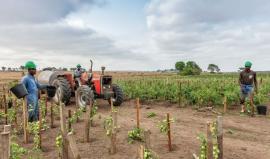
The Western Cape Provincial Government has called for the whole of government, every industry partner, researcher, farmer, and citizen – urban and rural – to unite in defence of the province’s agriculture sector.
This follows an increasing threat of animal disease outbreaks, including African swine fever, particularly in informal farming settlements, rabies in Cape Fur seals, and the detection of the low pathogenicity strain of avian influenza virus (AI H5), as well as other minor diseases. The AI H5 is mainly found in wild birds and generally causes mild or no symptoms in poultry.
The Western Cape MEC for Agriculture, Economic Development, and Tourism, Dr Ivan
Meyer, warned that diseases affecting isolated areas could significantly impact the province’s agricultural sector, its economy, and the thousands of jobs dependent on the industry.“We cannot afford to be complacent. Our Growth for Jobs strategy is built on clear goals and outcomes to create a better Western Cape for all. Disease outbreaks pose a direct threat to this vision.”
However, through cooperation, vigilance, and swift action, he believes the province can protect the health and sustainability of this sector and the well-being of every resident.
According to Meyer, biosecurity goes beyond trade and transnational movements of goods; it builds the foundation of disease prevention and control.
“This has practical implications for communities at the local level and in fast-changing and growing agri-food systems, where the production, processing, and distribution of food, plants, and animals are highly dynamic.”
State Veterinarian at the Western Cape Department of Agriculture’s office in Swellendam, Dr Christi Kloppers, said implementing biosecurity measures in informal or subsistence farming operations presents significant challenges for controlling animal diseases.
“The provincial and municipal resources should be used optimally to protect the economy and the livelihoods of our residents,” Kloppers.
The MEC said every outbreak prevented was “a business saved, a job protected, and a family’s future secured”.
“This means being alert, reporting suspected cases immediately, and adhering to the strictest biosecurity protocols – on farms, during the transport of livestock, and throughout the entire value chain.”
Meyer said this was not just an agricultural issue but had an economic and social imperative.
“By acting together now, we can safeguard our food security, sustain our exports, maintain the trust of our trading partners, and protect the livelihoods of thousands of Western Cape families.”
In the meantime, the provincial government is mobilising all available resources, coordinating closely with national authorities, and working together with industry to keep our province safe.
“As highlighted during my recent engagement with executive mayors and municipal managers, we believe that biosecurity is everyone’s business. So, throughout the value chain – from farm to fork – we should take the necessary steps to protect the integrity of agricultural produce.
“Doing so will support economic growth and help us create more jobs,” Meyer added. – SAnews.gov.za
No comments:
Post a Comment